Rules For Ray Diagrams









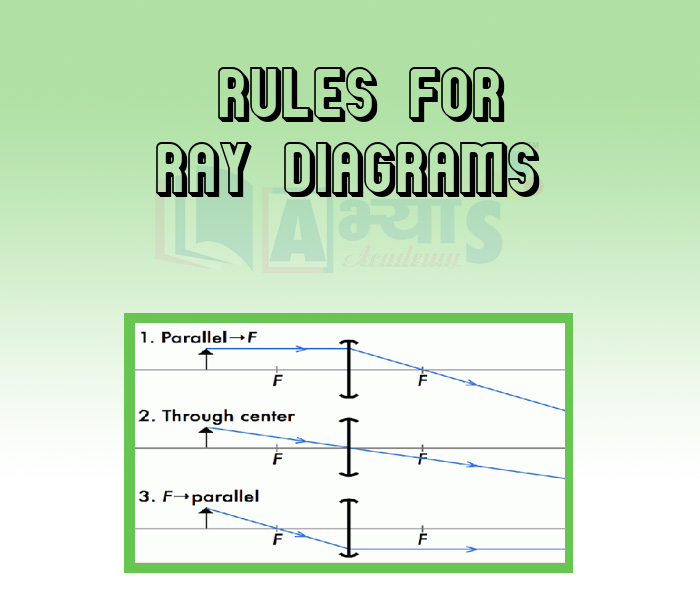
Rules For Ray Diagrams
Representation of Images Formed by Spherical Mirrors Using Ray Diagrams:
Many rays of light are coming from the point object or an extended object in all directions.The reflection of light follows the same two rules for all rays. The image of the object is formed at the intersection of the reflected rays To construct a ray diagram in order to locate the image of an object, it is more convenient to consider only two rays. The intersection of at least two reflected rays gives the position of image of the point object.
The following rays can be considered for locating the image
1.The rays coming parallel to the principal axis, pass through the focus after reflection in concave mirror or appear to come from focus in the case of convex mirror.
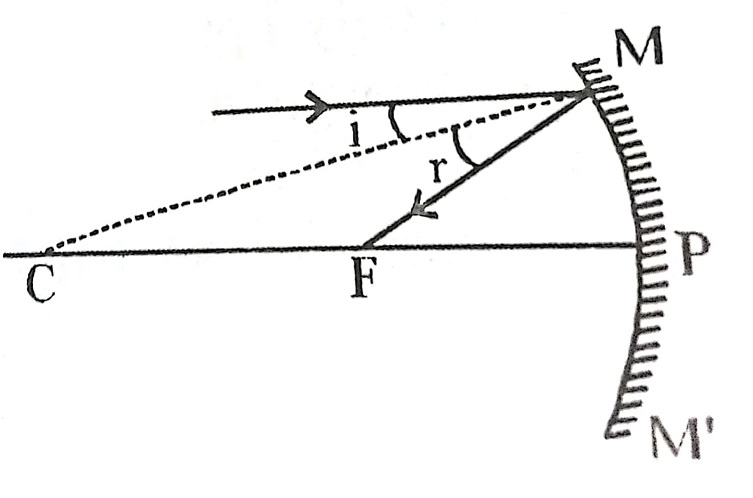 |
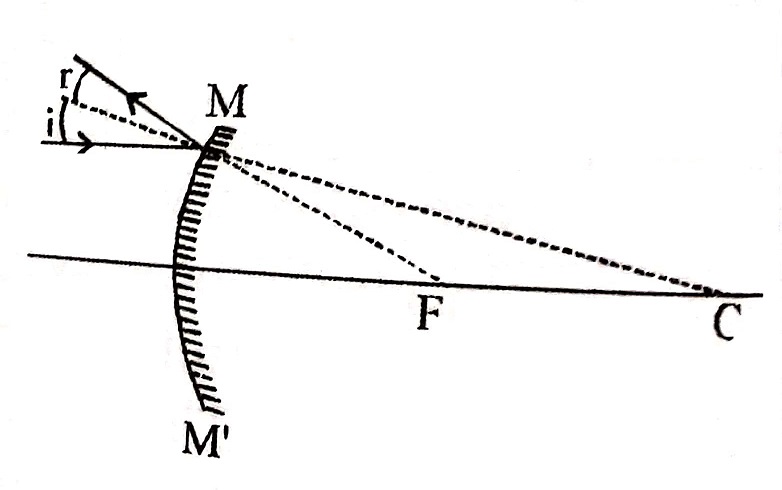 |
2. The rays coming through the focus of a concave mirror or coming towards focus of a convex mirror, become parallel to principal axis after reflection from the mirror.
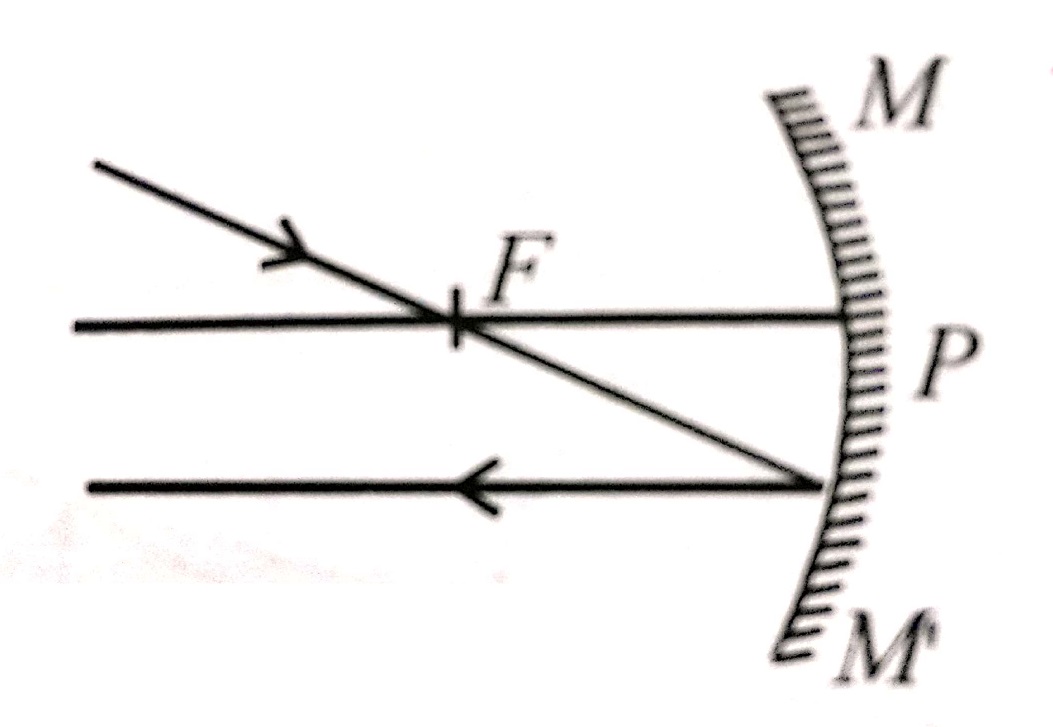 |
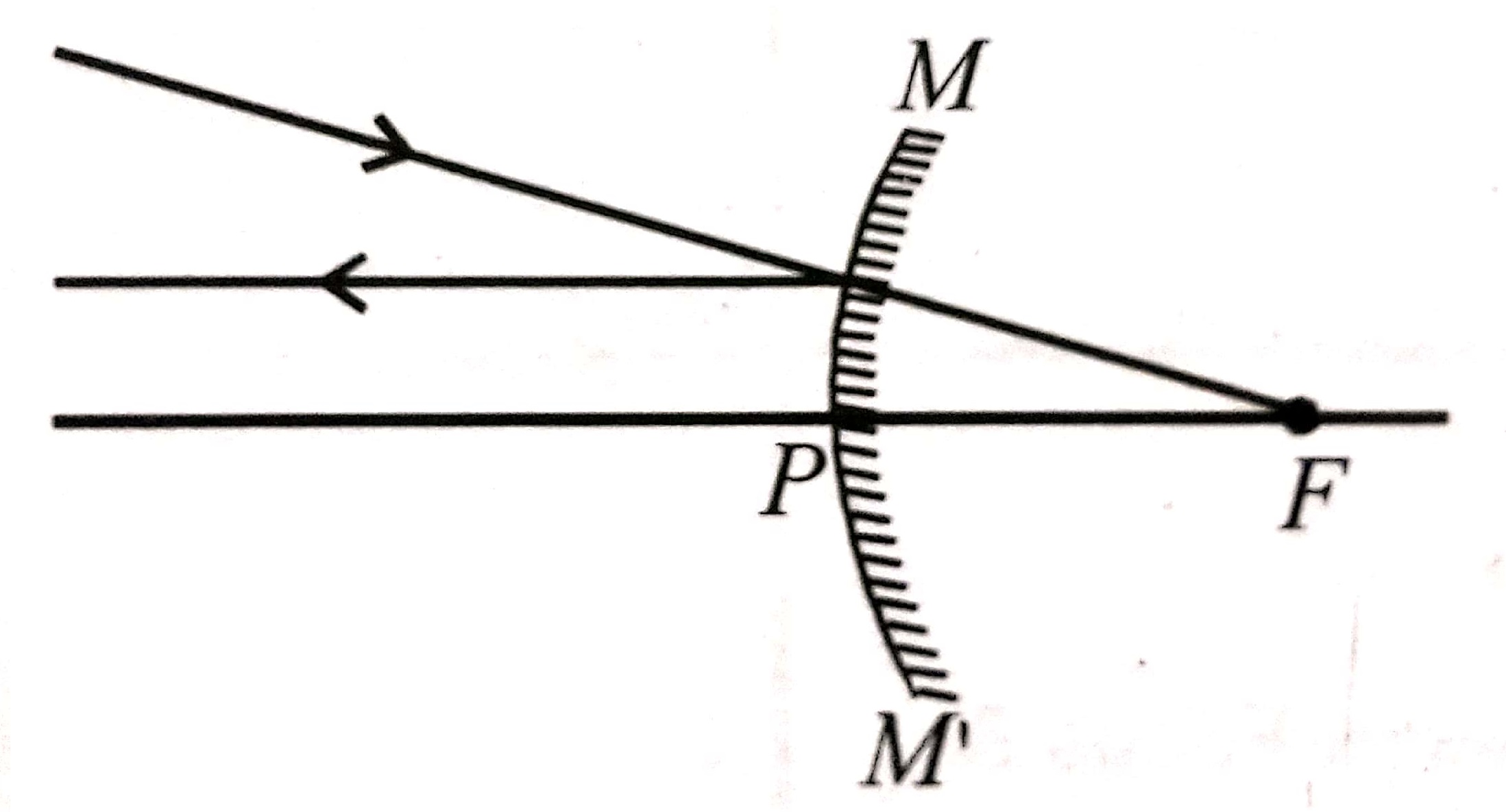 |
3. A ray coming through centre of curvature of a concave mirror or towards the direction of centre of curvature of a convex mirror, reflects back along the same path on striking the mirror surface.
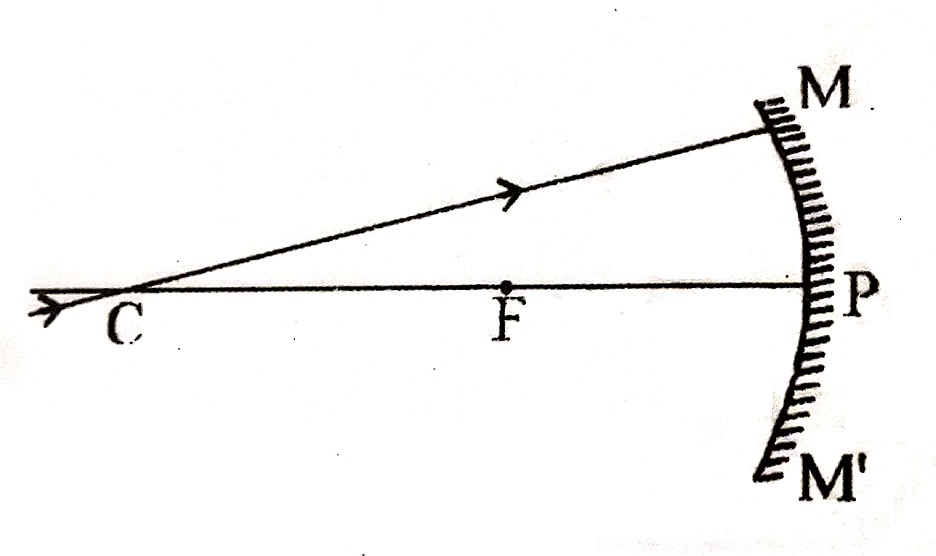 |
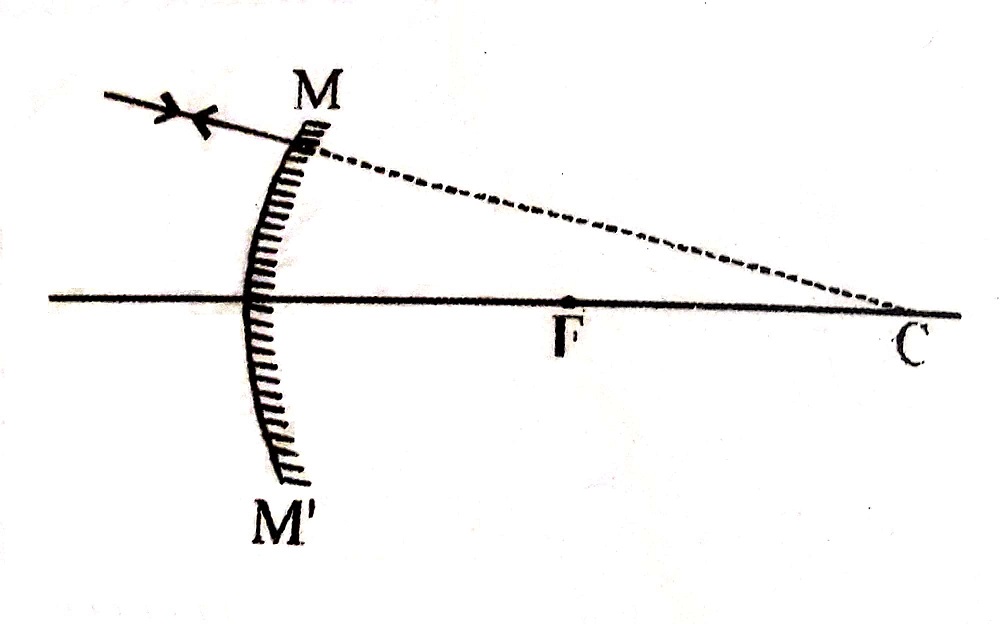 |
4. A ray incident obliquely to principal axis towards a pole P of the concave or convex mirror is reflected obliquely , following the laws of reflection. i.e., <i = <r.
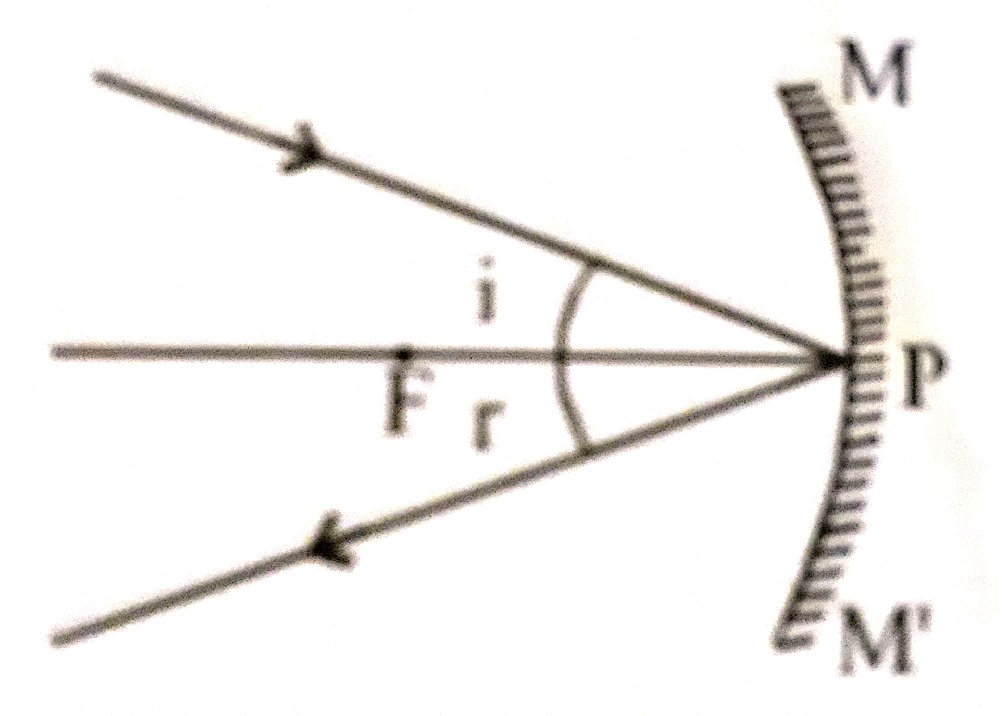 |
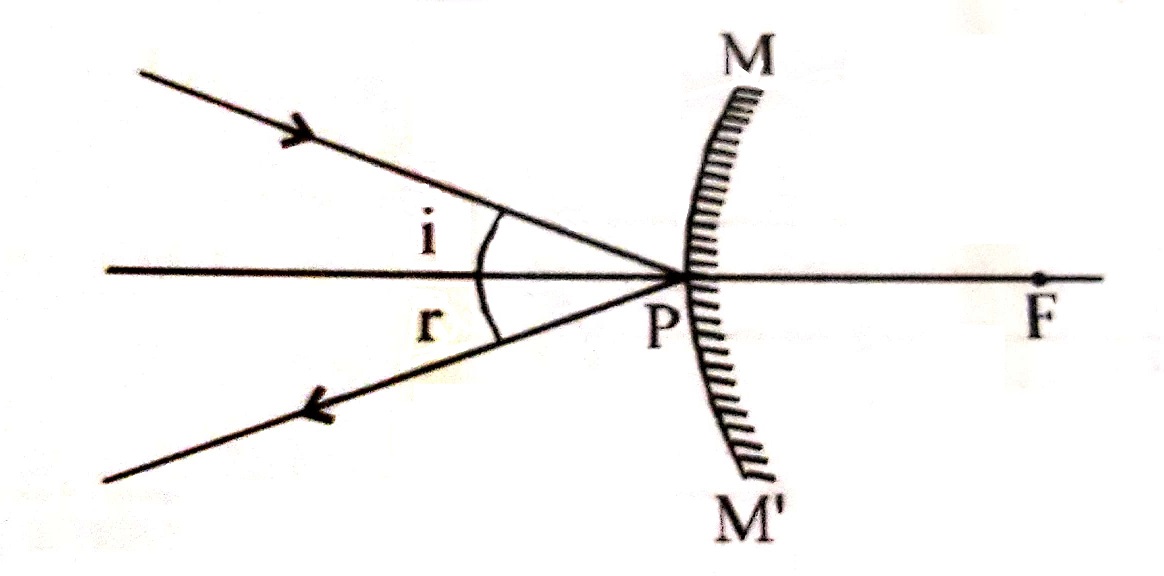 |
Point Object On the Principal Axis:
When the point source is placed at the principal axis of a spherical mirror. The ray along the principal axis will fall normally on the mirror and will retrace its path after reflection. Any other ray which will fall on the mirror will be reflected back (after projection) will cut the principal axis. The image of the point source is formed at that point on the principal axis.
Extended Object Placed Perpendicularly On the Principal Axis:
When the extended object is placed perpendicularly at the principal axis of a spherical mirror, the image of the extended object can be formed by locating the images of the individual point of the object. We can find the whole image by just locating the image of the top and the bottom of the object.
A ray coming through __________________ of a convex mirror, reflects back along the same path on striking the mirror surface. | |||
| Right Option : B | |||
| View Explanation | |||
Which of the following are correct : (a) A ray coming through centre of curvature of a concave mirror or towards the direction of centre of curvature of a convex mirror, reflects back along the same path on striking the mirror surface. (b) The rays coming through the focus of a concave mirror or coming towards focus of a convex mirror, become parallel to principal axis after reflection from the mirror. | |||
| Right Option : C | |||
| View Explanation | |||
Which of the following are correct : (a) Many rays of light are coming from the point object or an extended object in all directions. (b) The image of the object is formed at the intersection of the reflected rays. (c) The intersection of at least two reflected rays gives the position of image of the point object. | |||
| Right Option : D | |||
| View Explanation | |||
Students / Parents Reviews [20]
One of the best institutes to develope a child interest in studies.Provides SST and English knowledge also unlike other institutes. Teachers are co operative and friendly online tests andPPT develope practical knowledge also.

Aman Kumar Shrivastava
10thI have spent a wonderful time in Abhyas academy. It has made my reasoning more apt, English more stronger and Maths an interesting subject for me. It has given me a habbit of self studying

Yatharthi Sharma
10thA marvelous experience with Abhyas. I am glad to share that my ward has achieved more than enough at the Ambala ABHYAS centre. Years have passed on and more and more he has gained. May the centre flourish and develop day by day by the grace of God.

Archit Segal
7thMy experience with Abhyas academy is very good. I did not think that my every subject coming here will be so strong. The main thing is that the online tests had made me learn here more things.

Hiya Gupta
8thAbhyas institute is one of the best coaching institute in the vicinity of Ambala cantt.The institute provides good and quality education to the students.The teachers are well experienced and are very helpful in solving the problems. The major advantages of the institute is extra classes for weak...

Shreya Shrivastava
8thAbhyas academy is great place to learn. I have learnt a lot here they have finished my fear of not answering.It has created a habit of self studying in me.The teachers here are very supportive and helpful. Earlier my maths and science was good but now it has been much better than before.

Barkha Arora
10thAbhyas is an institute of high repute. Yogansh has taken admission last year. It creates abilities in child to prepare for competitive exams. Students are motivated by living prizes on basis of performance in Abhyas exams. He is satisfied with institute.

Yogansh Nyasi
7thIt has a great methodology. Students here can get analysis to their test quickly.We can learn easily through PPTs and the testing methods are good. We know that where we have to practice

Barkha Arora
10thUsually we see institutes offering objective based learning which usually causes a lag behind in subjective examinations which is the pattern followed by schools. I think it is really a work of planning to make us students grab the advantages of modes of examination, Objective Subjective and Onli...

Anika Saxena
8thAbhyas institute is one of the best coaching institute in the vicinity of Ambala Cantt area. The teachers of the institute are well experienced and very helpful in solving the problems of the students.The good thing of the institute is that it is providing extra classes for the students who are w...

Aman Kumar Shrivastava
10thAbhyas Methodology is very good. It is based on according to student and each child manages accordingly to its properly. Methodology has improved the abilities of students to shine them in future.

Manish Kumar
10thWhen I have not joined Abhyas Academy, my skills of solving maths problems were not clear. But, after joining it, my skills have been developed and my concepts of science and SST are very well. I also came to know about other subjects such as vedic maths and reasoning.

Sharandeep Singh
7thIn terms of methodology I want to say that institute provides expert guidence and results oriented monitering supplements by requsite study material along with regular tests which help the students to improve their education skills.The techniques of providing education helps the students to asses...

Aman Kumar Shrivastava
10thMy experience with Abhyas is very good. I have learnt many things here like vedic maths and reasoning also. Teachers here first take our doubts and then there are assignments to verify our weak points.

Shivam Rana
7thThird consective year,my ward is in Abhyas with nice experience of admin and transport support.Educational standard of the institute recumbent at satisfactory level. One thing would live to bring in notice that last year study books was distributed after half of the session was over,though study ...

Ayan Ghosh
8thAbhyas is a complete education Institute. Here extreme care is taken by teacher with the help of regular exam. Extra classes also conducted by the institute, if the student is weak.

Om Umang
10thAbout Abhyas metholodology the teachers are very nice and hardworking toward students.The Centre Head Mrs Anu Sethi is also a brilliant teacher.Abhyas has taught me how to overcome problems and has always taken my doubts and suppoeted me.

Shreya Shrivastava
8thIt was a good experience with Abhyas Academy. I even faced problems in starting but slowly and steadily overcomed. Especially reasoning classes helped me a lot.

Cheshta
10thMy experience with Abhyas academy is very nice or it can be said wonderful. I have been studying here from seven class. I have been completing my journey of three years. I am tinking that I should join Abhyas Academy in tenth class as I am seeing much improvement in Maths and English

Hridey Preet
9thThe experience was nice. I studied here for three years and saw a tremendous change in myself. I started liking subjects like English and SST which earlier I ran from. Extra knowledge gave me confidence to overcome competitive exams. One of the best institutes for secondary education.
